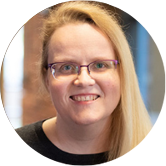January Expert Panel: Embracing Neurodiversity in STEM
Overview Blog Playlist Expert Panel Discussion Resources Synthesis Brief
Download(s);
- Webinar Chat
- Jodi Asbell-Clarke & Teon Edwards' Slides
- Wendy Martin & Sam Tumolo's Slides
- Lynn Cominsky's Slides
Description: This panel focuses on the connections between neurodiversity and STEM problem solving. Some of the same aspects of neurodiversity that are often characterized as deficits in learning are accompanied by talents that can be harnessed for STEM problem solving. Neurodivergent learners often bring unique strengths to STEM problem solving and should be encouraged and supported in their innovative ways of thinking. The projects discussed on this panel focus on novel pedagogical approaches to highlight neurodivergent thinkers' creativity, persistence, attention to detail, systematic thinking while also supporting their executive function. We look forward to your participation!
MODERATOR AND PANELIST BIOS

Dr. Ibrahim Dahlstrom-Hakki is a senior research scientist at TERC. A cognitive psychologist by training, his research focuses on the use of theories of cognitive science to improve STEM education for neurodiverse learners. Dr. Dahlstrom-Hakki has been the director of the Landmark College Institute for Research and Training, conducting research and providing professional development training to educators working with students with LD, ADHD, and autism. His current projects include exploring the use of VR, AR, and other technologies to teach science to neurodivergent learners.
Panelists:

Dr. Jodi Asbell-Clarke is an educational researcher focusing on game-based learning, computational thinking, and neurodiversity. Jodi’s academic background includes a MA in Math, an MSc in Astrophysics and a PhD in Curriculum, Teaching, and Learning. She has led national and international several STEM education projects involving curriculum development, professional development of teachers, and educational research. In 2009, she co-founded EdGE with her colleagues to study how game-based learning can transform STEM education, particularly for marginalized learners.

Teon Edwards is co-founder of and a lead designer for the Educational Gaming Environments group (EdGE) at TERC. Her work currently focuses on designing with and for neurodivergent learners. For INFACT, she’s developing computational thinking materials with scaffolds and differentiation resources to support students with executive function challenges. For UniVRsal Access, she’s co-designing and researching a STEM-based virtual reality game, Europa Prime, for a broad audience, including players with sensory, attention, and/or social issues.

Wendy Martin is as a principal research scientist at Education Development Center. She has led a number of NSF-funded projects that use a collaborative co-design approach with program developers, practitioners, and researchers to achieve a common goal. She is currently PI on a project focused on co-creating a maker/engineering out-of-school-time (OST) program for autism inclusion settings in New York City with educators, New York Hall of Science and, and experts in autism inclusion at New York University. She also collaborates with Sonoma State University and New York Hall of Science on NASA’s Neurodiversity Network (N3), which offers internships with NASA scientists and co-designs NASA educational programs with neurodivergent youth.

Lynn Cominsky is an award-winning Professor in the Physics and Astronomy Department at Sonoma State University (SSU) and the founder and director of SSU’s EdEon STEM Learning, which develops educational materials for NASA, NSF and the US Department of Education. Her newest NASA project is NASA’s Neurodiversity Network, which aims to develop resources and internships for teens on the autism spectrum.
Also joining the panel will be Sam Tumolo (she/they), senior coordinator in the Maker Space at the New York Hall of Science. As a neurodivergent learner themself, Sam is interested in designing educational experiences that include and inspire all types of learners to engage with STEM. Sam focuses on developing museum programs that afford visitors the opportunity to access their individual creativity while learning new skills and making connections to the world around them. Sam graduated from the Temple University Honors Program with a Bachelor’s degree in Environmental Studies.